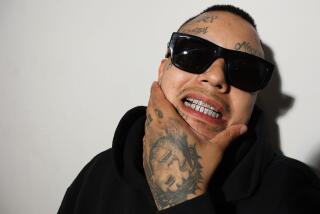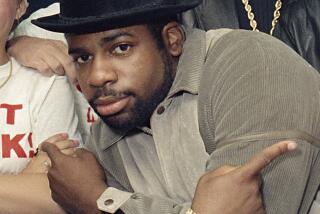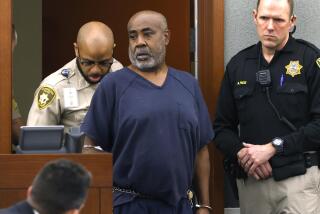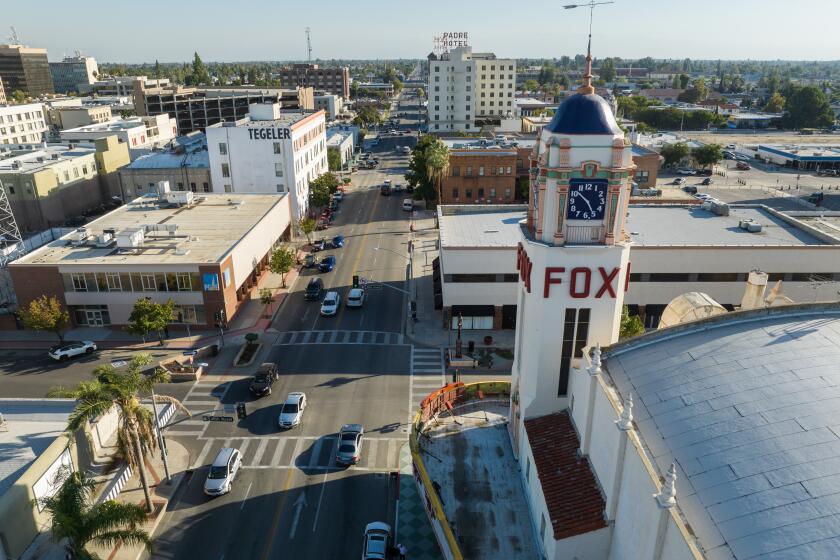Rap defense doesn’t stop death penalty
AUSTIN, Tex. -- The Song
’ I got a tech-9 now his smokin’ ass is mine . . .
Comin’ quickly up the streets
is the punk ass police
the first one jumped out and said freeze .
I popped him in his knees . ‘
“Crooked Ass Nigga” from recording “2PACALYPSE NOW” by Tupac Amaru Shakur
*
Ronald Ray Howard, who was sentenced to death Wednesday by a jury here, says he can still hear the scream of the highway patrolman he gunned down 15 months ago during a routine traffic stop on a dark road near Houston.
The Texas teen-ager is also haunted by a second memory from that tragic night: the angry rap music blasting from the tape deck as he pulled the trigger--music his attorney claimed was partially responsible for the slaying.
“The music was up as loud as it could go with gunshots and siren noises on it and my heart was pounding hard,” said Howard, speaking in the Travis County jail a couple of weeks before the sentencing, while recounting the night of April 11, 1992. “I watched him get out of his car in my side view mirror, and I was so hyped up, I just snapped. I jacked a bullet in the chamber and when he was close enough, I turned around and bam! I shot him.”
The cold-blooded killing of 43-year-old state trooper Bill Davidson sent a shudder through the music industry last year after Howard told authorities he was listening to Oakland rapper Tupac Amaru Shakur’s violence-laced “2PACALYPSE NOW” cassette during the homicide and thought it might have influenced his actions.
Howard’s lawyer tried to prove such a connection in this case. Describing the 19-year-old Howard as a “rap addict who lived, breathed and worshiped” the violent lifestyle portrayed in gangsta rap, Allen Tanner played jurors some of Howard’s favorite “cop-killing” songs by such artists as Shakur, the Geto Boys, Ice Cube, Ganksta N-I-P and N.W.A. Many of the compositions contain bloody depictions of urban violence.
But the eight-man, four-woman, mostly white and middle-aged jury--who convicted Howard June 8 of capital murder and deliberated for six days whether he should die by lethal injection--apparently did not buy the argument. However, twice during the sentencing deliberations, the jury reported it was deadlocked prior to reaching its decision. Tanner intends to appeal the death penalty decision.
“I feel real bad about this,” Howard said Wednesday. “I guess I’ll just have to deal with it. I saw my mom and my grandmother in court and I just told them to keep praying.”
The entertainment business--long criticized for glorifying violence on records, films and television--has been following the case closely because it is believed to be the first time a killer has cited music as a mitigating factor in the defense of a criminal trial.
Time Warner is particularly interested in the case because the media giant is named in a related negligence lawsuit filed last year by the trooper’s widow against Shakur and Interscope Records, the Time Warner-owned firm that released “2PACALYPSE NOW.” The multimillion-dollar civil suit is expected to reach trial by December.
Howard’s court-appointed attorney was unsuccessful in his bid to persuade the jury in this six-week Travis County Court trial that “gangsta rap and loaded guns are a lethal combination.” Time Warner lawyer James George doesn’t buy the argument either.
“In my opinion, this case has more to do with the gun industry than the music industry,” George said. “Unfortunately, the focus in the press has not been on the evil conduct of a career criminal, who appears to be a classic sociopath, but on the music he listened to. It was not a song that killed this fine officer but a bullet.”
Agreeing is Los Angeles rapper Ice-T, whose “Cop Killer” song touched off a firestorm of anti-rap sentiment last summer that ultimately forced Time Warner to release him from his recording contract.
“It’s a ridiculous defense,” Ice-T said. “The kid was caught between a rock and a hard place. He’s just trying to save his own skin.”
(Tupac himself has declined repeated requests to be interviewed.)
The ruthless Texas slaying has renewed criticism of the record industry and rekindled a decade-old debate over free speech and music lyrics.
In music-related wrongful death civil suits against heavy metal artists Ozzy Osbourne and Judas Priest, judges have ruled that controversial song lyrics are protected by the First Amendment. Several obscenity cases involving Miami rappers 2 Live Crew also have been dismissed or defeated on free-speech grounds in recent years.
Even though the jury rejected Howard’s music defense in the criminal case, record industry representatives express concern that the costly legal battle and negative press surrounding the civil trial ahead will only intensify criticism of the entertainment business--which has grown increasingly more cautious about releasing gangsta rap records.
Shortly after the widow’s lawsuit was filed, Time Warner-owned firms released controversial rappers Paris and Ice-T from their recording contracts and pressed at least half a dozen other hard-core rap acts including Shakur and Dr. Dre to change their lyrics.
Hard-core rap artists also have been dropped by other major record corporations, most of which now censor songs with “incendiary” lyrics that depict the shooting of police officers.
“Public companies must consider the interests of their shareholders,” said Danny Goldberg, senior vice president of Atlantic Records, a Time Warner label. “Historically there has always been a certain level of controversy beyond which big corporations tend to shy away from.”
David W. Harleston, president of Sony partner Def Jam Recordings, home to rappers Public Enemy and L.L. Cool J, questioned the industry’s retrenchment from the gangsta rap market.
“There certainly is an increasing sensitivity in the entertainment industry to the content of rap and hip-hop artists’ work,” Harleston said.
“But the fact that violent films and other forms of entertainment have not been subject to the same sort of criticism raises serious questions as to whether standards are being evenly and fairly applied.”
*
Two weeks ago, in his first interview after his arrest, the lean, 6-foot-2-inch rap fan acknowledged that it was in his best interest to accent the music angle in his case, but insisted he was sincere.
“Killing that trooper was the biggest mistake of my life and it’s my fault he’s dead, but I do believe the music affected me,” said Howard, who was caught lying under oath more than a dozen times during his trial at the Travis County Court. (The case was moved from Jackson County on a change of venue.)
“When I think back on it, I used to rap along with tapes about killing cops and talk (expletive) all the time how I’d do it someday. But, damn, there it was. The gun. The music. The cop. It was like the moment of truth. All the hatred came out at once.”
There is no scientific proof, psychologists say, that violent entertainment has ever provoked a murder.
Indeed, more than 400,000 of Shakur’s fans purchased the same album that Howard listened to the night he shot Davidson and none of them are believed to have ever been booked for killing a cop.
While lawyers and executives debate the merits of Howard’s legal defense, one thing most everyone agrees on is that the Texas teen-ager clearly lived the lifestyle often portrayed in gangsta rap songs.
He grew up on the streets of South Park, a tough Houston ghetto dominated by drug-dealing, prostitution and gang warfare--where automatic rifles can be purchased almost as easily as rap cassettes.
His grandmother, who was reared in a town where a “Negro” hanging tree still stands, has said she was almost raped once by a white policeman and raised her family to never trust a white person--especially cops.
As a child, Howard was beaten repeatedly by his father and dropped out of school after failing the eighth grade three times. By the time he was 15, Howard was stealing cars, dealing crack and tangling with what he calls “crooked” police.
“Where I come from people hate the police,” he said. “They harass you for nothing there, just because you’re a young black male, like Tupac says. But I never really thought about fighting back until I heard (N.W.A.’s) ‘F--- Tha Police.’ It was like, ‘Yeah, why should I just stand there and take that (expletive)?’ To me, rap never glorified violence. It just told the truth.”
*
The music, Howard says, reinforced his own observations, and he quickly became a gangsta rap aficionado, emulating attitudes espoused by the artists he idolized. Former friends and acquaintances testified that he constantly blasted violent songs on his boombox and that as the music grew meaner over the years, so did Howard.
Between the ages of 15 and 18, he fathered six children with four different women, several of whom he allegedly bragged about beating. Arrested twice for car theft and shot several times trying to flee the scene of a crime, Howard ran for years with a posse of gun-toting gangbangers and says he stole more than 500 cars before he killed Davidson.
While clinical studies confirm that exposure to violent entertainment can cause people to become more “callous and aggressive,” many, such as psychologist David Stewart, think Howard’s rough upbringing made him a good candidate for a violent homicide--even if he had never heard a rap song.
“Given the type of environment that this individual was brought up in, it’s doubtful whether music played a very large contributing factor to the violence,” the USC professor said. “On the other hand, you can’t just say the music had no effect on him at all.”
Indeed, all 12 jurors continually discussed the music’s influences during their six days of deliberations, according to attorneys for both sides. One juror believed the music was so important, he held out for a life sentence until Wednesday morning, sources said.
“I lived the hard life, but the music was always part of it,” said Howard, who can still recite from memory the violent lyrics to dozens of gangsta rap tunes from his 200-plus tape collection.
“Whenever a new tape by Ice Cube or Scarface came out, I’d go right out and buy it, and then I’d just play it over and over until it was pounding in my brain. That’s how it was that night with Tupac--the night I shot the trooper, that is.”
On the night of the shooting, Howard was driving a stolen Chevrolet Blazer down Highway 59 when Davidson stopped the vehicle to issue a ticket for a missing headlight.
During his hourlong drive from Houston preceding the traffic stop, Howard says he had been listening to a tape of mostly angry music by Houston’s Ganksta N-I-P and Shakur--including several songs that described young black males attacking “crooked” cops who attempted to harass or brutalize them.
When Davidson flagged Howard down, the officer had no idea that the vehicle was stolen. Howard claims the trooper smirked at him before pulling him over and that he was worried about being roughed up.
As he drew his truck to a stop, Howard says the tape deck was blasting a track by Shakur called “Crooked Ass Nigga.” These are some of the lyrics he recalls hearing as he loaded his 9mm pistol:
I got a tech-9 now his smokin’ ass is mine . . .
Comin’ quickly up the streets
is the punk ass police
the first one jumped out and said freeze
I popped him in his knees
After Howard shot Davidson, he was caught and confessed to the crime but never mentioned a word about rap.
Music didn’t become a factor in the case until Jackson County Dist. Atty. Robert E. (Bobby) Bell asked Howard a gang-related question about it during a grand jury investigation six weeks later. Police then recovered the homemade rap tape from the cassette deck of Howard’s stolen vehicle.
Howard’s obsession with angry rap didn’t end with his arrest, however, according to Bell, who prosecuted the case. Even after Howard was incarcerated, he asked friends to send him “cop-killing” tapes and composed his own gangsta rap lyrics. One stanza confiscated by police read:
Shot a cop
And watched him drop
Damn I said why did I
Have to use my 9?
Howard’s defense has not made him any friends in the rap community.
Two of his biggest idols, Houston recording artists Scarface and Ganksta N-I-P--both whom prosecutors threatened but failed to subpoena for the trial--called Howard’s anti-rap defense “ludicrous.”
“That cop’s death had absolutely nothing to do with rap and (Howard) knows it,” Scarface said. “No rapper was sitting next to him in his truck that night sayin’, ‘Hey, homeboy, shoot that (expletive).’ (Howard) killed that cop himself.”
Ganksta N-I-P echoed Scarface’s anger about the case: “If (Howard) had just sat and listened to the music instead of doing what he did, maybe he wouldn’t have wound up in this situation.”
Looking back on it now, Howard wishes he had done things differently. He wishes he had never started selling drugs or stealing cars. He wishes he had stayed in school. But, most of all, he wishes he had never shot Davidson.
Still, Howard says he has no regrets about his anti-rap defense and might possibly testify on behalf of the widow in her upcoming civil suit. He hopes it may help discourage his two young siblings from following in his footsteps.
“I wrote my little sister and brother and I told them to stay away from drugs and guns, and I told them don’t listen to that old hard-core rap stuff either, because it can affect you,” Howard said. “I told them, ‘Go listen to M. C. Hammer or something else.’ I know not everybody goes too far with it, but some people do. Look at me. Look what I did.”
More to Read
Start your day right
Sign up for Essential California for news, features and recommendations from the L.A. Times and beyond in your inbox six days a week.
You may occasionally receive promotional content from the Los Angeles Times.






